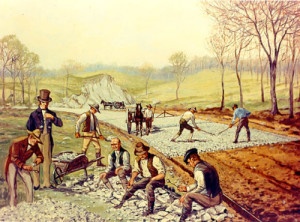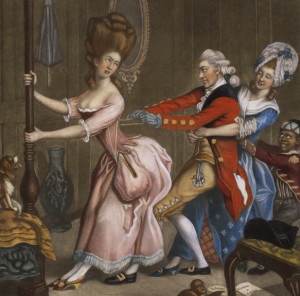Welcome to All Things Austen in April! Today, I am writing about the world Jane Austen lived in.
Jane Austen was born at a fascinating time. In America, His Majesty’s oldest colony was in revolt, and the war would rage on for eight very long years. Another revolution played a larger role in Jane’s life. The French Revolution and its aftermath, the Napoleonic Wars, would not end until 1815, two years before her death. Two of her brothers, Charles and Francis, both naval officers (at right), fought the French on the high seas and shared stories of their exploits with their sister. Because of the war, the family would feel the pinch of the tax collector. (With her brothers serving in the navy, Jane writes with confidence of naval officers in Persuasion.)
It was also a fascinating time in the arts. Jane’s contemporaries were Goethe, Byron, Wordsworth, Keats, Shelley, Scott, Mary Shelley, the Grimm Brothers; Beethoven, Rossini, Haydn, Mozart; Canova, Goya, Turner, Constable, and John Singleton Copley.
 There were important industrial and scientific advances. The British cotton industry employed 90,000 factory workers and 184,000 handloom weavers, making Britain an economic powerhouse in textiles. Humphry Davy had invented the miner’s safety lamp. This invention greatly reduced explosions as a result of methane explosions. British road surveyor John Macadam constructed roads of crushed stone, greatly improving road travel. (See picture at left.) The Comet, Henry Bell’s steamship, operated on the Clyde River in Scotland. The Apothecaries Act, the beginning of the regulation of the medical profession in Britain, forbade unqualified doctors from practicing. Considering what the medical elite was inflicting on the mad King George III at Windsor Castle, the profession definitely needed regulating.)
There were important industrial and scientific advances. The British cotton industry employed 90,000 factory workers and 184,000 handloom weavers, making Britain an economic powerhouse in textiles. Humphry Davy had invented the miner’s safety lamp. This invention greatly reduced explosions as a result of methane explosions. British road surveyor John Macadam constructed roads of crushed stone, greatly improving road travel. (See picture at left.) The Comet, Henry Bell’s steamship, operated on the Clyde River in Scotland. The Apothecaries Act, the beginning of the regulation of the medical profession in Britain, forbade unqualified doctors from practicing. Considering what the medical elite was inflicting on the mad King George III at Windsor Castle, the profession definitely needed regulating.)
Led by William Wilberforce and members of the Society of Friends, in 1807, the “Act for the Abolition of the Slave Trade” was passed in Parliament, but it would be another thirty years before slavery itself was outlawed. Jane disapproved of slavery. In Emma, the father of the self-absorbed Mrs. Elton is shown to be a “Bristol Merchant.” Bristol was a major slave-trading port. There are also references in Mansfield Park where Sir Thomas Bertram owns a plantation in Antigua.
 Fashion had undergone its own revolution. For women, the wide-as-a-barn look gave way to the simple A-line dress with waists inching up until they were just under the breasts. For men, clothing favored by the fashion-conscious fops, including wigs, had been replaced by the austere look favored by Beau Brummel. Brummel was so influential that the future George IV often visited Brummel in his home for the purpose of watching him dress. According to Bill Bryson in At Home, the corpulent royal had his own challenges: “Some of the fashion was dictated by the ever-increasing stoutness of the Prince of Wales (or “Prince of Whales,” as he was known behind his back). By the time he reached his thirties, the prince had taken on such a fleshy sprawl that he had to be forcibly strapped into a corset… All this pushed his upper body fat upward through the neck hole, like toothpaste coming out of a tube, so the very high collars fashionable in his day were a kind of additional mini corset designed to hide an abundance of chins and the floppy wattle of his neck.”
Fashion had undergone its own revolution. For women, the wide-as-a-barn look gave way to the simple A-line dress with waists inching up until they were just under the breasts. For men, clothing favored by the fashion-conscious fops, including wigs, had been replaced by the austere look favored by Beau Brummel. Brummel was so influential that the future George IV often visited Brummel in his home for the purpose of watching him dress. According to Bill Bryson in At Home, the corpulent royal had his own challenges: “Some of the fashion was dictated by the ever-increasing stoutness of the Prince of Wales (or “Prince of Whales,” as he was known behind his back). By the time he reached his thirties, the prince had taken on such a fleshy sprawl that he had to be forcibly strapped into a corset… All this pushed his upper body fat upward through the neck hole, like toothpaste coming out of a tube, so the very high collars fashionable in his day were a kind of additional mini corset designed to hide an abundance of chins and the floppy wattle of his neck.”
Jane’s brilliance had brought about its own revolution. In her novels, she created believable characters who resonate nearly two-hundred years after her death. I can only imagine what she would have accomplished if she had had access to a computer.
Your comments are always appreciated.
______________
In researching this article, I came across a book review in the JASNA newsletter from the summer of 2011 of Gwen Hyman’s Gentlemen Are What They Eat. The following is a passage from the review:
Hyman examines Mr. Woodhouse…who confines himself to a peasant’s diet of gruel, boiled eggs, and overcooked apples… Hyman observes that Woodhouse’s simple tastes are dictated by common socio-political fears of the Regency period. Woodhouse believes in eating only local food because the then-contemporary “innovations” in canned foods meant that poorly preserved (if not outright rotten) food was being mass-produced for the first time, causing widespread food poisonings. Mr. Woodhouse’s distaste for layered, frosted cakes comes from his distrust of the newly trendy French chefs that had come to England in the wake of the French Revolution, bringing with them sauces and icings that disguised the quality of food stock and signaled a creeping Jacobin influence in British culture… It is also significant, from a food perspective, that the novel’s “invader” figures–Frank Churchill and the Eltons–are linked through dialogue and dietary habits to French cooking, gluttony, and imported, indigestible confections.
That excerpt shows the advantage Jane Austen’s early readers have over their twenty-first century admirers. Jane’s contemporaries would have understood Mr. Woodhouse’s reasons for not eating cake. I thought I would share.

38 comments
Skip to comment form
Ahhhh…..giving Jane Austen computer access would indeed have been something! I’ve wondered at her reaction if I showed her the 1995 version of P&P in DVD mode on my laptop.
Author
P&P 1995 is a very good representation of her novel. I think she’d be pleased.
The last section on food is particularly interesting. With Mrs. Bennet going on about French chefs in many of the variations I’ve read, it appears that she was quite ignorant of their “arts and allurements” for disguising poor quality food. I should think that the Bennets had a much healthier diet at Longbourn with their local food than members of the ton did with their access to the latest culinary trends.
Good point. In the original P&P, Mrs. Bennet laments about there being no fish available, but if it’s not fresh, who wants it? I read a fan fiction recently (sorry, don’t remember the name or author), where Caroline is so intent on Impressing Darcy that she has his favorite seafood, clams, brought up from London. Thankfully, he doesn’t eat any. Jane gets terribly ill, and Hurst dies.
Author
Oh, boy! Not good. Thanks for commenting.
June, that fan fiction you refer to was The Abominable Mr. Darcy by Quietdaisy (aka J. Dawn King) on fanfiction.net. It really brings home to us what could happen without modern refrigeration and indeed, modern medicine, doesn’t it?
Yes, that was it! Thank you.
Author
With their country houses, the wealthy were able to get away from the filth of London. But their rich diets set them up for gout and diabetes. In many ways, the Bennets were better off.
Very interesting article. Would love to time travel back to the Regency times although just for a look, would not want to stay there. We are so lucky living in this century with medical advances, sanitation etc.
Thanks Mary another enjoyable article.
Author
I agree. It’s a nice place to visit, but I wouldn’t want to live there.
I find it quite interesting that food poisoning was common place, and it seems it would’ve been more common amongst the members of the ton, rather than the common people. As Florence says, in many variations Mrs. Bennet talks about French chefs, I have seen those where Caroline speaks of them as well making her ignorant, as well, of the sauces used to hide the less than stellar quality of the food.
Author
With canning, of course, you had the risk of botulism. It was a good time to be a vegan. 🙂
A comprehensive overview, Mary.
Author
Thanks, Tony.
I can’t imagine what was in some of those concoctions the apothecaries and doctors had people take! They certainly couldn’t drink water unless for tea and then it was boiled and consumed alot of alcohol! What is fantastic are the contemporaries of Jane Austen. She was in good company! The music composers alone were amazing! Thank you Mary!
Author
Of course, in this country (US), we know that snake-oil concoctions sometimes resulted in blindness. I really do appreciate food inspectors.
didn’t realise that was the reason for the very high collars
The reason for the high collars was new to me–thanks!
BTW, the author Jill Heydt-Stevenson, who has written about sexual allusions in Jane Austen’s books, gives a different interpretation of Mr Woodhouse. Based on his trying to recall the poem “Kitty, a fair but frozen maid” (a work full of references to sex–and a man having sex with virgins to ‘cure’ his malady), she posits that Mr W sowed his oats when he was younger and is suffering from tertiary syphilis. His diet being of the type prescribed for that disease.
Author
Tertiary syphilis? That’s pretty bad. Let’s hope it was something more benign. Thanks for sharing.
I’m learning so many interesting facts this month! To wear high collars to hide fat chins… fashion has always been a dictature in people’s lives.
I appreciate the listing of JA’s contemporaries as well as the times she wrote in. Thanks1
My goodness would Jane have had fun with how the times are now, she would have her own website, fb page and I can only imagine how funny her posts would be. I love thinking about it 🙂
Author
Jane was known for her sharp wit. I wonder if she would have used it on her critics. 🙂
Entire article is very interesting, but the explanation of Mr. Woodhouse’s peculiar dietary habits is fascinating!
Author
Thanks, Regina. I thought so, too.
All this talk about food brought to mind some remarks made by Benjamin Wjitlow who played Mr. Bennett in the 1995 P&P. In the filming of a dinner scene he was asked what kind of dessert he would like as he would be eating it in the scene. The choice of gooseberry fool proved to be too much as take after take he began to hate the stuff! Even recreating food in Austen’s time proves difficult!
Author
I’ve read where all actors hate eating scenes. The food gets cold. Sometimes they spray stuff on it to make it look better, etc.
This was so interesting to read. There were really a lot of societal changes taking place during Jane’s time. Thanks for sharing it!
Author
You are welcome, Susan. Thanks for commenting.
Thank you for this post – I have often wondered why Mr Woodhouse was so fussy about his own diet and those of his guests. It always felt as if I was about to giggle when he explains about his cook being able to boil an egg correctly or when he turns away food that has arrived from the kitchen and his guests try not to mention it to Emma Woodhouse but maybe I should be more respectful of his care.
Author
Knowing what we know now, Woodhouse was ahead of his time. Thanks for commenting.
I often think about the lack of safe ways to store and preserve foods when I read about meal planning or dinners in these stories. I am sure a lot of people suffered indigestion, vomiting, diarrhea, etc. much less food poisoning and even death from that problem. But then they didn’t know any better. Thanks for the information and look at this topic.
Author
I’ve thought about that, too. With canned food being introduced, I can’t help but think about botulism!
Lead poisoning, even more likely!
Thanks for auch a fascinating article, Mary. Who would have guessed at the reason for those high pointed collars that some of our actors wear with such distinction?
As for Mr. Woodhouse, I’ll certainly be viewing his dietary foibles in a new light next time I read Emma.
Author
Thanks, Anji.
Wow-such incredible facts–thanks for sharing with us, Mary!! 😀
Warmly,
Susanne 🙂
Author
Thanks, Susanne. I always appreciate your comments.